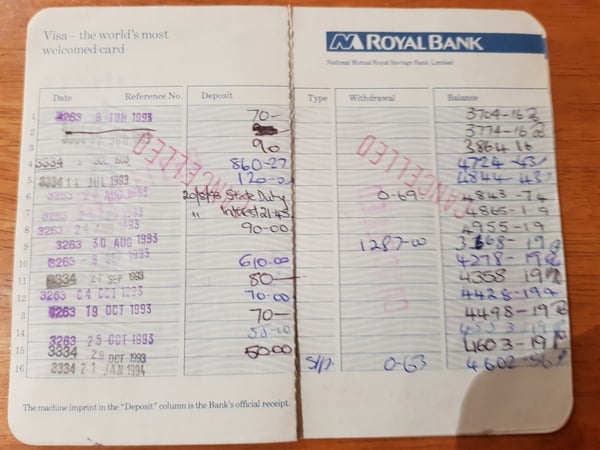
How did you develop your personal financial habits and do they correlate with your business habits as a business owner? Perhaps it only takes a short trip down memory lane to understand how your attitudes came about, from an early age.
This post was prompted recently during reflection about how personal success and habits are formed in running your own business when I was cleaning out some achieved possessions stored away for many years..
Personal discipline and habits

I found one of my old bank savings passbooks from when I was a teenager (for those that remember what a passbook is!). For those that grew up in Melbourne and remember, it was a National Mutual Royal Bank (which became Bank of Melbourne) passbook.
When I opened it showed my savings details over about a period of about five years while I was working my first part-time job, a casual role at Coles supermarket. I remember aim to save at least 90% of each weekly pay packet – and somehow, surprisingly, I managed to achieve this.
This sparked my thinking about the fundamentals of developing discipline, resilience and successful habits in business, and how many of these habits develop as a child and as a teenager with your money values. Many are formed and shaped by your parents’ attitudes and values. Without turning this post into a personal development article, I do believe that while your influences can draw you into or away from those values, be it positively or negatively, you do have a choice in where you would like to be.
I wonder how many kids these days (with some entrepreneurial aptitude or potential) could have a digital savings account like this. Are the days of the piggy bank or forced savings still strong or is the digital world or cashless society going to further change spending habits? Do parents today still encourage the values of savings for goals or do they give in and provide more for their kids?

I remember the only splurges I made as a teenager was to afford to buy myself my original Atari game console for $90 and also saving to buy my first car for $5,000 when I passed my probationary drivers licence test. This was all without my parents assisting me or gifting me any money for these purchases. If the goal is strong enough you will stay focussed and on track.
In basic terms, having only credits and minimal debits must be an ideal situation. For any financial planning or wealth planning exercise these are fundamentals of building wealth. Not spending more than what you earn to be able to save consistently and reinvesting this for compound growth or leverage is a simple ‘how-to’.
It was instilled into me early as part of my financial values to always set goals and stretch to achieve even greater goals. Having strong cashflow has already enabled personal or business decisions and options to be considered. In small business often too much focus is based on driving revenue growth but the importance of cashflow and profitability shouldn't be made secondary priorities in your financial plan.
In my professional life these values have always applied and the need to have the discipline to not lose sight of this. If you reinvest your profits regularly and utilise the impact of compounding and leverage, the returns will help you increase the value of your investment. The value of passive income streams versus earned income has been emphasised, having seen many businesses put all their eggs in one basket.
From my cultural background, both of my parents traditionally valued the effort of earning a dollar, so every dollar saved was worth something significant to come in the future. Some might call this a very frugal approach but this habit (and discipline) provides the skills in running and managing a business also. I have always believed in delayed gratification also as opposed to "instant gratification" for the purpose of short term spend, but to maintain positive cashflow and sufficient reserves for the "just in case" factor.
So what can business owners do to stay focussed and disciplined?
As a business owner you need to keep your eye on the end goal as well as regularly reviewing your incremental goals and ensuring you have tightly managed your credits and debits (simply speaking). Simply managing your business spend based on knowing your cash inflow and cash outflow isn't enough.
The first step is to be aware of your early habits for discipline and focus. If you know you are not naturally great at managing money or need more financial management skills, seek someone you trust to help coach you or guide you to be more accountable or responsible on a weekly or monthly basis.
I believe, to some extent, in the ‘slow and steady wins the race’ approach, and that there is ‘no get rich quick’ scheme unless you significantly increase your risk tolerance. For some, luck and timing also plays a part achieving success.
Make sure you know your business financials - don’t just leave it up to someone else to manage your finances and advise or update you. This includes knowing your profit margins and monthly cash inflows and outflows. If it's outside your budget don't stray outside what is committed already.
For any aspirational business owners this is a good simple reminder of how a solid foundation creates success. To help with that, ensure you have the right people, processes and systems setup as part of your foundation and business planning.
Some tips for business owners:
In summary here are some basic business fundamentals for small business owners or someone who is starting out:
- Set your goals - both short term and longer term strategies
- Regularly review your goals whilst keeping focus
- Keep a positive attitude and your business motivation up, particularly in the face of setbacks or disappointments
- Allow a sufficient financial buffer (‘rainy day’ preparation) for any unforeseen risks and cashflow issues – plan for best case and worst case scenarios
- Don’t miss out on opportunity costs versus being overinvested in one particular asset
- Keep an open mind and be open to left field opportunities
- Always look for ROI in any investments you make, not just speculation (unless you are prepared to lose that amount anyway)
- Establishing clarity with your overall goal or ultimate purpose of the business
- Establish multiple annuity revenue streams where possible
- You must know your business numbers and overall financial position
- Be open to change - the definition of insanity is doing the same thing over and over again whilst expecting a different result
- Know your risk appetite and keep managing it amongst your external environment to make sure you are not exposed.
If this resonates with you as a business owner and you would like to get back on track or accelerate your growth please contact us on +61 3 92255022 or info@alchemiseconsulting.com to book in a time to meet with us.
In the meantime, to help kick start your cashflow and growth, here is a FREE copy of our E-Book " How to increase your profits with seven profit multipliers"


